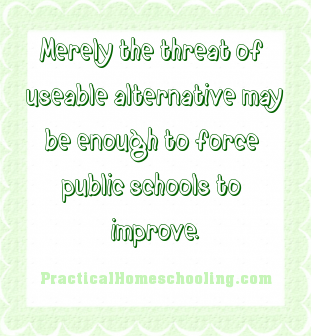 The benefits of homeschooling to homeschooled children have been documented - well-adjusted, literate students that excel on standardized examinations. Likewise, the inadequacies of public education are well known. Indeed, the average SAT scores of homeschooled children are considerably higher than those of individuals who choose public education. Homeschooling, according to our research, may offer additional benefits that have not been considered. We find that homeschooling provides competition for the public schools - competition that forces the public schools to improve the quality of education delivered.
The benefits of homeschooling to homeschooled children have been documented - well-adjusted, literate students that excel on standardized examinations. Likewise, the inadequacies of public education are well known. Indeed, the average SAT scores of homeschooled children are considerably higher than those of individuals who choose public education. Homeschooling, according to our research, may offer additional benefits that have not been considered. We find that homeschooling provides competition for the public schools - competition that forces the public schools to improve the quality of education delivered.
Public schools, for the most part, do not have to compete for students because students are primarily assigned to schools on a geographic basis. Thus, the public school system functions as a monopoly and suffers from all the problems inherent with this type of market structure. The results are disturbing. With the release of the Third International Mathematics and Science Study in February of 1998, Americans learned that our students lag behind the students of other nations in both math and science. U.S. high school seniors came in last in physics, sixteenth in general science knowledge, and nineteenth in general math skills among the twenty-one nations in the study.
Monopoly breeds inefficiency, results in high costs, and is slow to respond to customers' demands for quality; competition produces efficiency and innovation. Breaking up the public school monopoly by offering alternatives that provide competition has been touted as one method to improve education. Evidence for this proposition exists.
Looking into the relationship between public and private schools, Couch and Shughart (1993), Minter Hoxby (1994), and Borland and Howsen (1996) all reach the same conclusion: Public schools, when faced with competition from private schools, produce students that score higher on standardized exams than when no private alternatives are available.
Furthermore, the competition does not have to actually exist. In a 1994 article, Lubman reports that charter schools, which are often freed from state regulations and union restrictions, provide competition for public schools. She asserts that "the mere threat of a charter school, even when one doesn't get approved, sometimes prods sluggish school systems to make changes."
Economists, studying the performance of firms in terms of pricing and output decisions, have found that competition and potential competition have an impact on the behavior of firms. Homeschooling, or the option for parents to select homeschooling, may force public schools to improve.
The ease with which a parent dissatisfied with public education can homeschool his child depends in large part upon the degree of regulation within a state. In states with tight restrictions, the public school monopoly is not threatened. Homeschooling in such an environment is not a viable option for many and therefore provides little if any competition. In a less regulated state, homeschooling may offer a legitimate alternative to parents that are unhappy with the quality of education provided by the public sector.
The degree of regulation varies widely from state to state according to Christopher Klicka in Home Schooling in the United States, 1997. In Tennessee, for example, "the parent-teacher must have a high-school diploma or a GED to teach grades K-8 and have a college degree to teach grades 9-12 or request an exemption from the commissioner." Most exemption requests are rejected. Moreover, "Grades 5, 7, and 9 must take a standardized test administered by the commissioner of education or someone designated by him or by a professional testing service approved by the local education agency." If scores are deemed too low, the parent must consult with a licensed teacher in order to design an appropriate remedial course. In addition, parents must notify the local school superintendent about their proposed hours of instruction and maintain attendance records which are subject to inspection. Alaska, on the other hand, exempts a child from compulsory attendance if the child is being educated in his home by a parent or guardian. "There are no requirements to notify, seek approval, test, file forms, or have any teacher qualifications. The burden is on the state to prove that parents are not teaching their children."
Choosing homeschooling in a state like Alaska is easier than choosing homeschooling in a state like Tennessee. Government intrusiveness serves to insulate the public school monopoly from competition.
To test this hypothesis, we examined the average proficiency of eighth-grade students on mathematics content area by state on a standardized test administered in 1996. Controlling for both student and school characteristics thought to influence test scores, we found that more lenient requirements for homeschooling within a state translates into a higher quality of education delivered by the public sector. In particular, the more restrictions a state places on teacher qualification, the lower the state's public school students score on the mathematics proficiency exam.
By making the homeschooling option more difficult, the state protects an established industry - the public schools. Competition, whether from charter schools, private schools, or homeschools, has been shown to improve the quality of education delivered by public schools.
Those parents selecting homeschooling not only provide an excellent education for their own children but also exert pressure on the public schools forcing them to more adequately educate their neighbors' children as well. State policy makers, seeking to improve the schools in their states, should consider relaxing the regulations imposed on homeschooling.